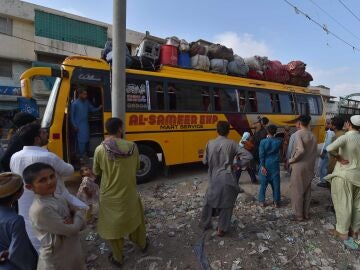
More than 12,000 people affected and 20 villages were completely destroyed by the 6.3 magnitude earthquake and consecutive aftershocks that hit western Afghanistan last Saturday, leaving more than 2,400 dead and more than 2,000 injured, according to humanitarian organizations and the government.
An estimated 12,110 people, including 1,730 families, were affected by the earthquake in five districts of the province of Herat, where the tremors occurred, the UN Office for the Coordination of Humanitarian Affairs (OCHA) reported in a letter this Tuesday. In the worst affected district, Zindah Jan, the epicenter of the earthquakes, OCHA estimated that 1,350 families suffered total losses, followed by 150 in Injil, 95 in Gulran, 60 in Khosan and 30 in Robat-e-Sangai, all located in the province of Herat.
In Zindah Jan 100% of the houses were completely destroyed and 485 people are still wanted, 294 of them women, OCHA added. The Taliban government estimates that about 4,500 were killed or injured by the earthquake, but “it is difficult to pinpoint the exact number of dead and injured,” spokesman for the Taliban government’s Ministry of Disaster Management, Mullah Janan, said yesterday. Sayeq.
Until the last balance offered yesterday, the dead exceeded 2,400. On top of that, “20 villages were completely destroyed and all people need help with food, non-food materials and shelter,” according to the spokesperson. Afghanistan felt at least seven tremors on Saturday.
The first of all, the largest, occurred at 12:11 (+5:30 GMT) 14 kilometers deep and 33 kilometers from Zindah Jan, located in the province of Herat, according to the USGS. Three other earthquakes of up to 5.1 magnitude were felt yesterday in the same region while rescue operations are taking place.
The Afghan authorities, in their latest assessment, estimated that the dead and injured exceed 4,500. This is the third deadliest earthquake since 1998 in Afghanistan and the worst tragedy the Taliban have had to face since they took control of Afghanistan in August 2021, without access to the financial system and international reserves.
Source: Lasexta
Ricardo is a renowned author and journalist, known for his exceptional writing on top-news stories. He currently works as a writer at the 247 News Agency, where he is known for his ability to deliver breaking news and insightful analysis on the most pressing issues of the day.












